Chocolate Lab – Your Guide To The Chocolate Labrador Retriever
The Chocolate Lab is a friendly, confident and loving dog with great character and huge appeal as a pet. You may have heard rumors that chocolate labs are less intelligent and more prone to health problems than their yellow and black Lab cousins. So we’ll be clearing up a few myths, and finding out if there is more to the chocolate Lab than just fur color!
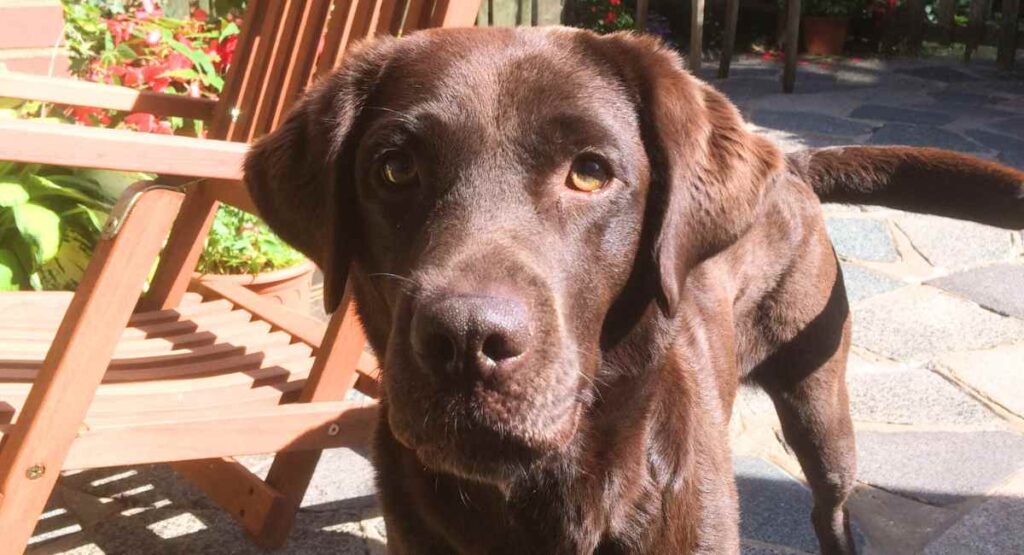
- Where did chocolate Labs come from?
- Coat color, shades, and easy genetics
- English vs American chocolate Labs
- Traits: What to expect from your chocolate Lab
- Are chocolate Labs stupid?
- Silver vs chocolate Labs
- Finding Chocolate Labrador puppies
- Chocolate Lab training
- Old chocolate Labs
I’ll share my experience of raising and training chocolate Labradors. We’ll look at what you can expect in terms of temperament, behavior, and physical characteristics. And I’ll help you with feeding and training your dog, from puppyhood to old age.
Where do Chocolate Labs come from?
Labrador Retrievers were recognised by the UK Kennel Club in 1903 and by the AKC in 1917. The Labrador breed was developed mainly by a couple of English aristocrats in the 1800s, from dogs they had imported from North America.

Although our early Labrador Retrievers were predominantly black, throughout the history of the breed, chocolate Labrador dogs (sometimes referred to as liver Labradors) have appeared occasionally in litters of puppies.
Way back in the last century, chocolate puppies were sometimes culled at birth! Black Labs were adored, and black was the only color considered respectable for a Labrador.
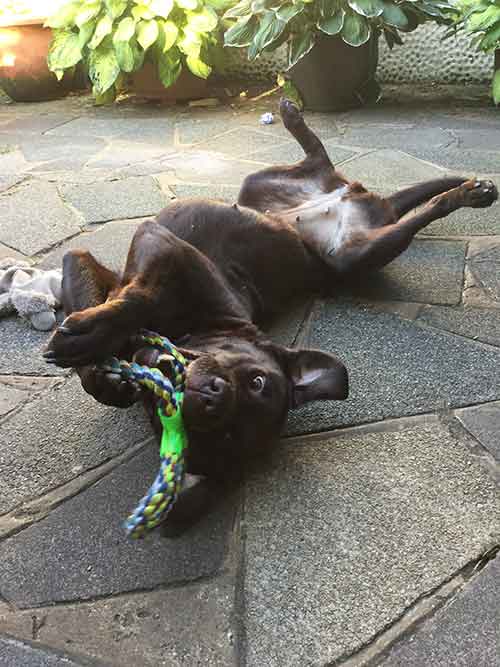
Fortunately those attitudes are well and truly behind us, and in the last few decades the chocolate Lab has gone from strength to strength.
How is the Chocolate Color Inherited in Labradors?
To understand how brown puppies can be born to two black dogs, we need to take a peep at how coat color is inherited in the Labrador retriever.
The instructions that tell your dog what to look like, and what color to be, come packed in genes. And genes come in pairs. This is true for the gene that determines whether or not the Labrador will be brown (this gene is called b) or black (B). Every Labrador has either two genes for a black coat (BB) or two genes for a brown coat (bb) or one of each (Bb).

The color black in Labradors is dominant. That means that if a Labrador has one gene for the color brown, and one gene for the color black, the dog will be black.
The hidden gene
This is because the black gene switches off the brown one. The brown gene remains hidden, doing nothing in particular, while the black gene takes control of fur color.
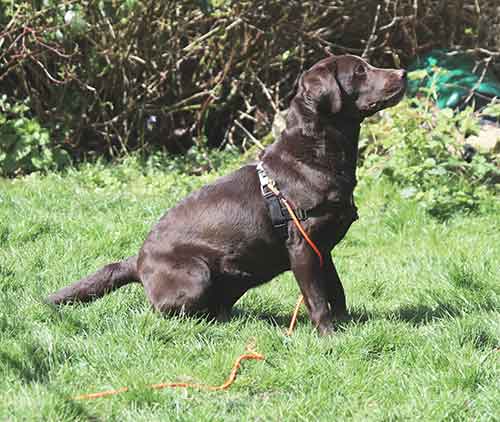
The brown gene only gets to be in charge if it is paired with another brown gene. But a black Labrador can sneakily carry a brown gene (Bb) and pass it along to his children. This is how the color brown can remain hidden in generation after generation of black Labradors.
Chocolate Labrador Shades
Unlike our yellow Labradors – which come in a wide range of shades, the color chocolate is pretty consistent in puppyhood. Most chocolate Labs are quite similar in color, though eye color can vary from gold to dark brown.
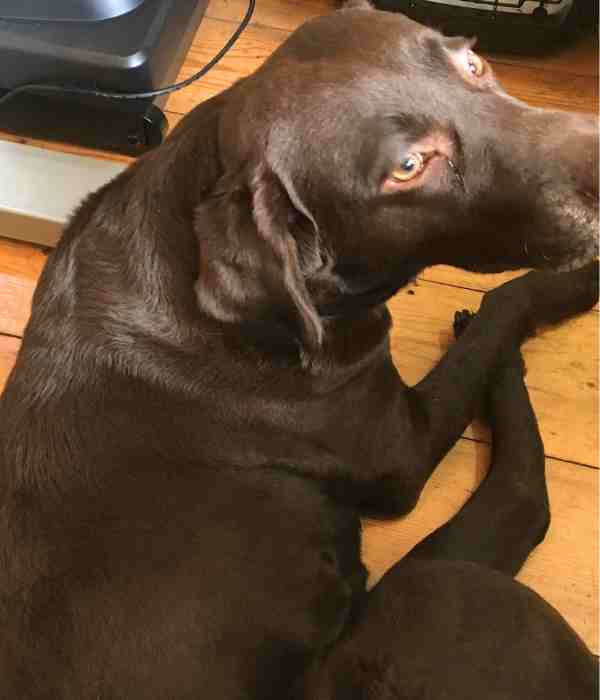
The color of your adult chocolate Labrador Retriever boy or girl’s coat will, however, vary depending on whether the coat is newly grown after a molt, or is about to shed. As the old hair dies it starts to lose some of its color, and the dead hair is much paler than the glossy dark chestnut-colored coat that will soon appear.
And though some chocolate Labs are darker than others, even when taking the stage of molt into account, variations between individuals are fairly small, with one very contentious exception. The Silver Labrador, which is a variation of the chocolate fur color. We’ll be looking a bit more closely at that below.
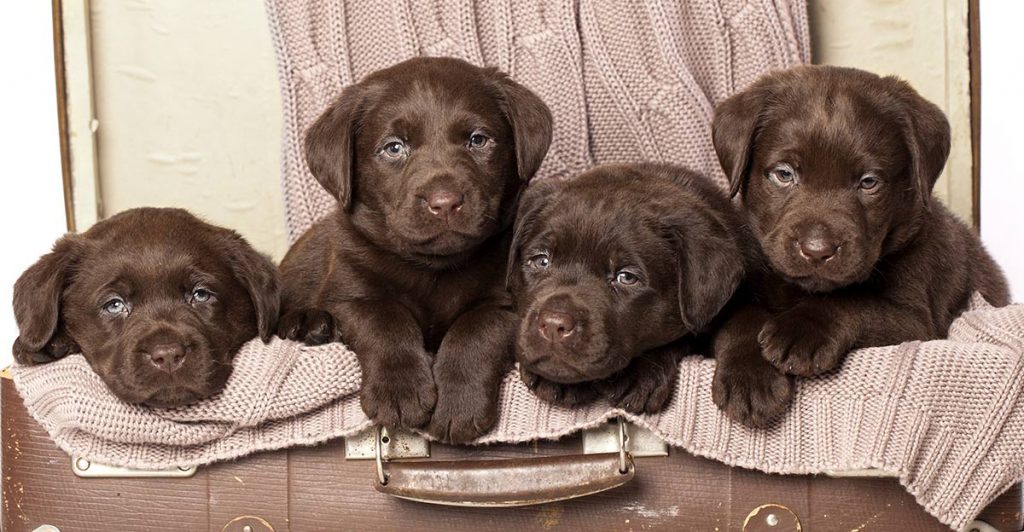
When did Chocolate Labs become Popular?
By the 1920s and 30s a few brown or liver Labradors, as they were then called, were making an appearance on the shooting field. But for some years more, brown was not widely acceptable to Labrador enthusiasts. It wasn’t until the 1960s that brown Labs began to really grow in popularity.
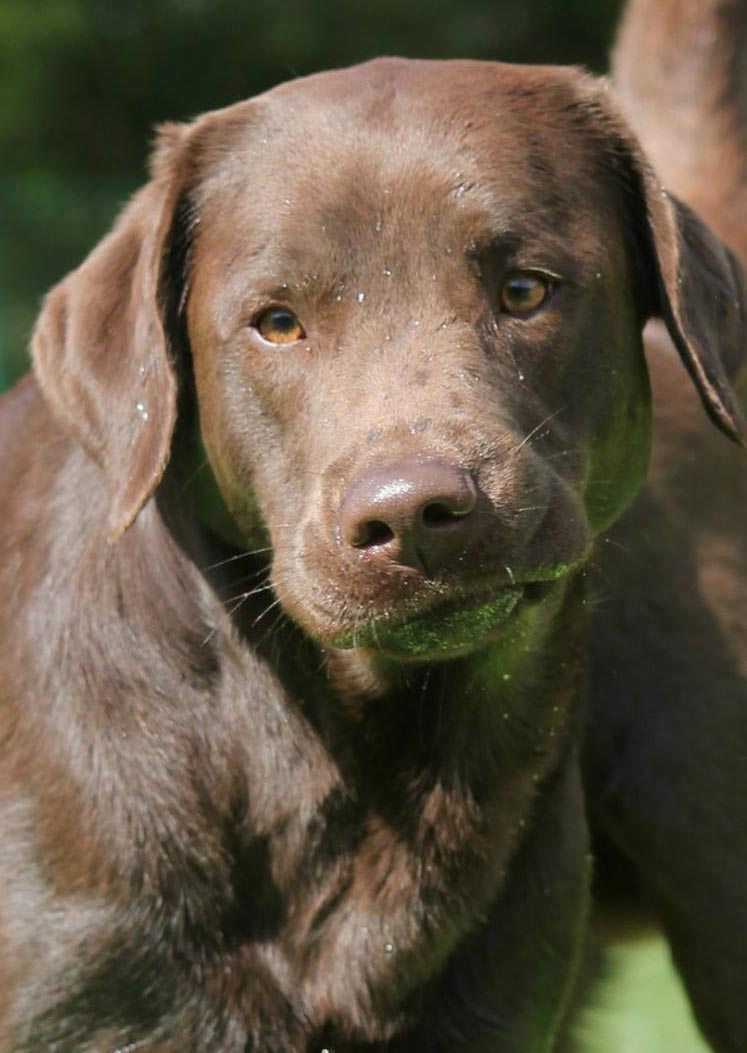
The demand for these beautiful dogs came from ordinary home owners and they much preferred the word ‘chocolate’ to describe their companions.
That preference continues today, and we often name our brown Labs after favorite snack bars and chocolate flavored drinks! You can however still register chocolate Labradors as ‘liver’ in color.
Different Types Of Chocolate Lab
As the popularity of Labs began to expand beyond the shooting community that developed the breed, they began to split into two different types. Those dogs mainly bred for show and companionship. And dogs mainly bred for hunting and retrieving.
English Chocolate Lab
English Labs are those bred for Shows. The first chocolate English Show Champion Labrador Retriever was Cookridge Tango in 1964. The 1960s was a turning point in the popularity of the chocolate Lab, but interest grew slowly at first.
Gradually, the public began to demand more chocolate Lab puppies, and breeders began to produce them. Over the next few decades, Chocolate Labradors became increasingly popular both in the show ring and as pets. In the shooting community, where Labradors were expected to do a job of work, the preference for black continued throughout the late 1900s, and into the present day, particularly in the UK.
American Chocolate Lab
American chocolate Labradors were bred to work, and are also known as field Labradors. The chocolate Lab has now become more established in the working community, but they are harder to find. There is a rumour going around that this is because brown Labradors are a bit stupid! We’ll look at that below.
 Chocolate Lab Characteristics
Chocolate Lab Characteristics
The split that occurred between show lines and working lines of Labrador, affected different colors of Labrador in different ways.
The black Lab remained the popular choice of the hunting fraternity, while the popularity of the chocolate Lab took off largely outside of the hunting community. And the traits or characteristics of chocolate Labs reflect their primary role as pets or companion dogs. As a result there are differences not only in temperament, but also in size and shape.
How Big Do Full Grown Chocolate Labs Get?
Show Labradors (English) are more heavily built, somewhat slower, and physically less agile than their field bred counterparts. Some English brown Labs may reach 80 or 90lbs without being fat or overweight. Whereas American chocolate Labs are often lighter.
My Lab Rachael, for example, weighs less than 60lbs. Most males of her build will weigh five or ten pounds more. English chocolate Labs are also more likely to have a chunky Labrador head and thick otter tail. And while some feel that the chunkiness of the skull has been taken too far in show lines, there is no denying the beauty of a classic Labrador head.
Show Labs also have smaller ears and a wider muzzle. A brown Labrador is more likely to be from these show types of bloodline and are therefore more likely to share these general characteristics. But there is more. It isn’t just body shape that is inherited.

Chocolate Lab Temperament
American Labs may have a more intense retrieve drive, or urge to chase and retrieve things than their show bred cousins. They also tend to be not only physically faster and racily built, but more ‘sensitive’ and responsive to training.
Field bred Labs tend to be quite dependent on their handler’s approval. In short, they are desperate to please. Over many generations this biddable quality has been bred into our working Labs alongside their retrieving and hunting prowess. This has given working dogs a rather different temperament from our show stock.
Chocolate Lab Intelligence
In show dogs you may see a more robust temperament. An English chocolate Lab is often less concerned over the little ups and downs of life. It’s all a bit of fun. Nothing is taken too seriously. Many English chocolate Lab owners report that their dogs are especially playful. And I have certainly found that to be the case with Rachael. She adores soft toys and spends hours playing with her Flat Squirrel!
The more serious nature of the American chocolate Lab doesn’t necessarily mean that field bred labs are more clever. However, they may less distractible, more focused and therefore easier to train. This can certainly give the impression of a dog that is pretty smart. These dogs may also be more likely to be black.
The important thing to remember is that these differences in ‘trainability’ if you like to call them that, are minimal. English Labs are still highly intelligent, highly trainable dogs. The differences between field and show might give you the edge in competition. However, they are not going to make any difference to your dog’s basic obedience training, or your pet’s behavior.
They are also becoming increasingly irrelevant as we switch to more modern methods of training which are much better at motivating dogs to engage in the training process. Now let’s find out why working retrievers are not usually brown.
Any color as long as it’s black!
We mentioned earlier that the color black has long been favoured by the working retriever community. Experienced, working gundog enthusiasts are less likely to buy a puppy that is not from working lines, and when they do, they are more likely to choose a black dog. Unsurprisingly this means that most working lines of Labs are predominantly black.
Black is also a great color for a hunting companion. A yellow dog really stands out in the countryside, even in poor light, so even when yellow dogs became more common, they were not so popular with the hunter. Brown dogs are better camouflaged but became more numerous much later and were embraced first by the pet and show communities.
Are Chocolate Labs Stupid?
To my knowledge, no study has ever been carried out on the differing intellectual abilities of Labrador of different colors. Everything you hear is based on personal anecdotal stories, often passed along in fun. At least to begin with! I found my own female chocolate Labrador from mixed lines to be a lot more ‘playful’ and interested in other dogs, than my working bred Labradors generally are.
She had very intense retrieve drive, but was less naturally keen to share the outcome with anyone. She was also easily distracted and because of this she took me a little longer to train than my working line Labs. I’ve heard others report the same observations. But it is most unlikely that there is any distinct difference in intelligence between dogs of the same breed that happen to be a different color.
Being chocolate does not make a dog stupid
Even if there were a difference in learning ability between different colored dogs, it does not mean that one caused the other. The answer lies in the behavior and temperament of dogs from different bloodlines.
Fashion
The difference in trainability is in short a feature of the difference between the field bred dog and the show bred dog. Not a feature of the color of the dog. And choice of color was originally down to fashion.
Ulitmately it is a coincidence that many chocolate Labradors are English in type, and many black Labs are American in type. Because of this coincidence the characteristics of the show bred Lab tend to be attributed to our brown friends. While the characteristics of the field bred Lab tend to be attributed to our black dogs.
So you can see how the myth got started. The fact is, that chocolate Labs from working lines are just as easy to train as black Labs from working lines. But you are less likely to meet a chocolate Lab from working lines at the moment.
Rest assured, your chocolate friend is not stupid. With modern training methods you can easily teach them to be a well behaved and obedient dog.
Silver Labs Are Chocolate Labs
Silver Labradors have a gene which dilutes the color chocolate and makes it a pale, silvery shade. Some people find this very attractive, while others regard it as an abomination. How the coat dilution gene got into our Labrador Retrievers is a matter for debate. Many believe that this gene has appeared quite recently.
One theory is that the gene arrived through cross breeding a Labrador with a dog that carries the dilute coat color gene. A breed such as the Weimaraner for example. Another explanation is that the gene causing the silver coat was some kind of genetic ‘accident’ or mutation. This seems rather less likely. The AKC is currently willing to register silver Labs, despite the dispute over their ancestry, but they can only be registered as ‘chocolate’. Not as silver itself.
A bright Future for the Chocolate Lab
Throughout history, there have been a number of famous black Labradors, and we tend to associate yellow Labs with the all important role of working as assistance dogs. Bill Clinton’s chocolate Labrador Buddy was famous simply for being the president’s dog, but it is harder to find examples of chocolate Labradors who have distinguished themselves.
This is not because chocolate Lab dogs lack the qualities or abilities of black and yellow dogs, but simply because the popularity of the color is a relatively recent phenomenon. There are as we speak, plenty of chocolate Labradors serving in the military, working as assistance dogs and in the shooting field. Their story has only just begun, and as time goes on, we’ll be hearing more of their exploits.
How to Find A Chocolate Lab
There are two main ways of bringing a chocolate Labrador retriever into your life. And many people will tell you that the very best way, is to rescue a dog from a shelter or dog’s home. The other way, is to buy a chocolate Lab puppy and raise them yourself. If you want to go the puppy route, then you’ll find my book Choosing The Perfect Puppy(paid link) a helpful guide. There are pros and cons to both rescuing an older dog and raising your own puppy, I go into these in some detail in The Labrador Handbook(paid link).
(paid link)It may well depend on what stage of life your family is at and on how experienced you are with dogs in general, and with Labradors in particular. If rescuing appeals to you, and you are ready for the challenges and the many benefits of giving a dog a new lease of life, there are plenty of rescue societies that specialise in Labradors.
Rescuing a Chocolate Labrador
The first step is to make contact with your local Labrador Rescue. Most rescues don’t rehome dogs outside their own ‘catchment area’. Rescuing can be a wonderful and fulfilling way of bringing a lovely brown retriever into your life, so do consider it thoroughly. You can find lots more information here: Labrador Rescue and Rehoming and here Bringing Home A Rescue Dog.
If now is not the right time for you to rescue an older dog. Or if you are getting a Labrador for a special purpose – as a hunting companion for example – you may be better off with a new puppy.
Buying a Chocolate Lab Puppy
Chocolate Labrador puppies are ready to go to their permanent homes at around eight weeks old. If someone wants to sell you a puppy much younger than that, alarm bells should be ringing. You also need to make sure you buy your puppy from the right place.
This means choosing the right breeder. And avoiding puppy mills and pet stores. If you want a puppy for hunting, you need to go to a breeder that specialises in field-bred dogs. If you want to get involved in the world of showing, go to a breeder that breeds Labradors for the show ring. It is possible to train a show dog for work, though he or she is unlikely to get far in high level competitions. But it is not normally possible to succeed in the show ring with a field bred dog. Their body shape and structure is too different. Keep this in mind.
Chocolate Labrador Puppy Health
Labradors of all colors suffer from inherited disorders. Do make sure your puppy is from health tested parents. Their parents should have good hip scores, good elbow scores, clear eye tests and be PRA clear too.
If your puppy’s parents are in good health, you increase the odds for your puppy.
Are Chocolate Labs Less Healthy?
In 2018 a study hit the headlines hard, and had a lot of chocolate Lab owners in a panic. Their research suggested that there is a link between Lab color and not just health, but lifespan too. Over 33,000 Labs were studied, with 23.8% of them chocolate. Giving a good sample size.
Chocolate Labs in the study were more likely to have dermatitis, which matches with some anecdotal reports from owners of silver Labs with skin problems.
Ear problems are also more common, and this is in fact something Rachael suffered with. Gastrointestinal issues were more common with chocolate Labradors too.
Chocolate Labradors live on average for just 10.7 years, where yellow and black Labs come out at 12.1 years. Interestingly, they were least likely to have degenerative joint disease or dental problems.
Avoiding Health Problems in Chocolate Labs
Health testing is important for any puppy buyer. But it is also important to look at the coefficient of inbreeding. Chocolate Labs get their color from a recessive gene. This means that to ensure you have a litter of chocolate puppies you need to breed from two chocolate parents. This limits your options further than the average breeder who isn’t interested in the color of their puppies. Reducing gene pools will tend to increase health problems.
Finding a puppy with a very low coefficient of inbreeding will help you to avoid some of these problems. In addition to health testing, it would also be sensible to avoid a chocolate Lab puppy with parents that have a history of ear or skin problems.
You can find out more about health issues in Labradors in this article: Health screening for Labrador Diseases. And there is lots of information on finding a good breeder here: Labrador breeders – how to find a good one
Training and Exercising your Chocolate Labrador
My advice for training your chocolate Labrador is to follow a good positive reinforcement training program. Make sure you exercise your dog’s mind as well as their body. Even if you never intend to take them hunting, every Lab needs a job to do, this can be as simple as finding toys and carrying out simple retrieves.
Training is important but its also fun. If your dog is from show lines, they too will need training and plenty of exercise, but they may also need plenty of play. Toys and games, and other dogs to interact with.
Training my Chocolate Lab
Even as an old dog, Rachael still loved to play with other dogs and with people. She was hugely enthusiastic about meeting people (and dogs) and prone to be a little over-friendly.
I therefore had to spend a bit more time ‘proofing’ basic obedience than I would with one of my yellow or black American Labs. And I had to make a special effort to ensure that she is not allowed to interact with visitors until she was sitting calmly. You may find you have to do the same with your dog.
On the plus side, I had to spend less time socializing Rachael than I would have with a field bred lab. As she took everything in her stride.
Caring for an old Chocolate Lab
Elderly chocolate Labradors are particularly beautiful, with their greying muzzles and kind eyes. As the years pass by, we leave behind one set of challenges and they are replaced by new ones. Failing eyesight, stiff joints, and declining hearing. However, these senior years can still be happy and fun filled for many dogs, especially if you keep your dog slim.
If your chocolate friend is heavily built as many chocolates are, you need to be extra careful to keep an eye on his weight as he ages. More weight means more stress and strain on joints, this can aggravate problems like arthritis.
Keep walking your senior dog for as long as they are enjoying their daily exercise. Of course, you will want to make your old friend as comfortable as you can, so go ahead and indulge them with cosy blankets, a nice orthopaedic mattress or a special place on your sofa.
I’d love to hear about your own chocolate Lab, so do drop your story in the comments box below. Tell us what is so special about your chocolate Labrador and why you think they are the best.

Free Labrador Updates!
Get my training tips, news, reviews, and the latest from The Labrador Site delivered to your inbox

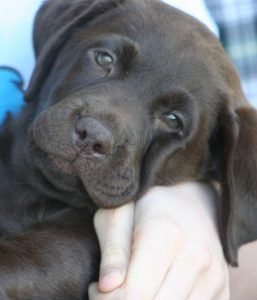
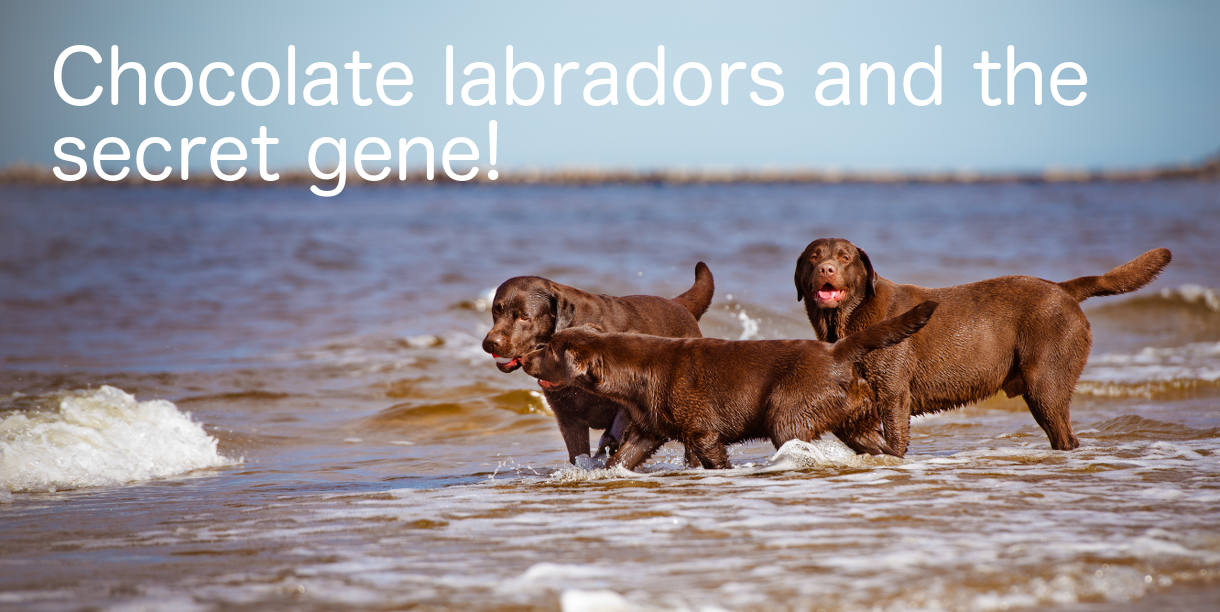
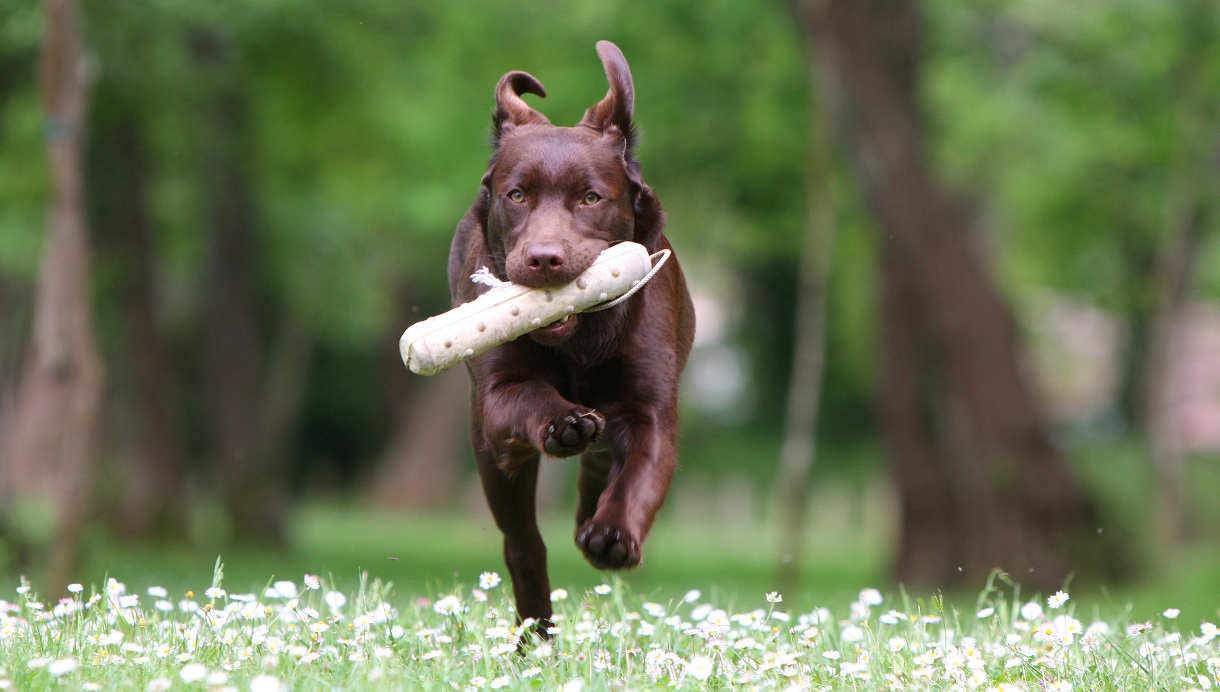
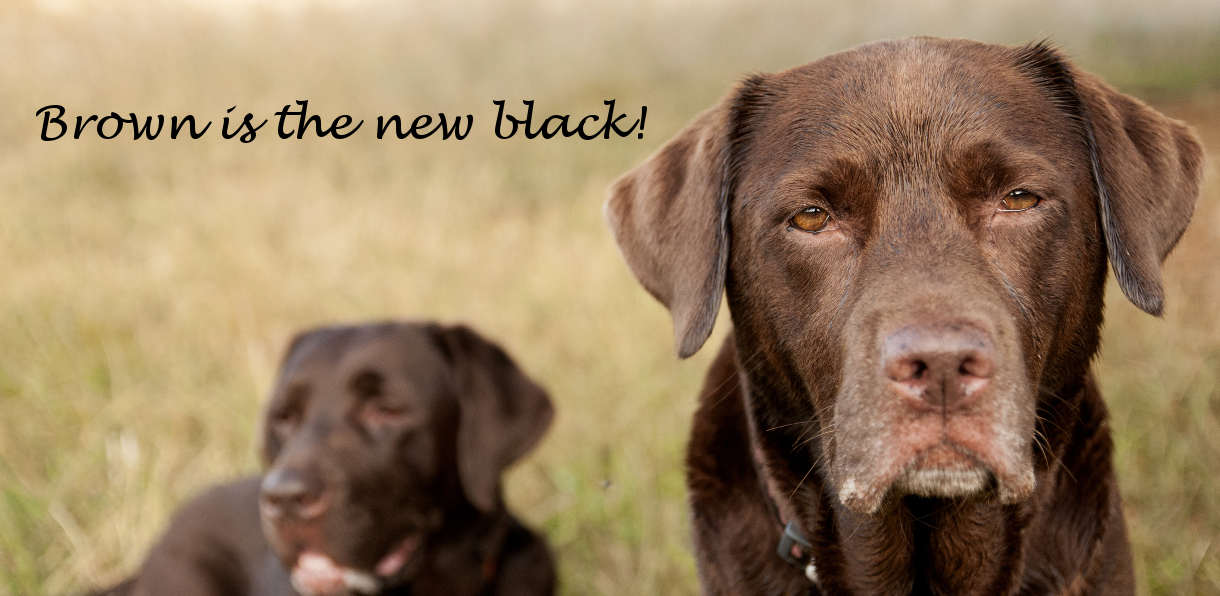
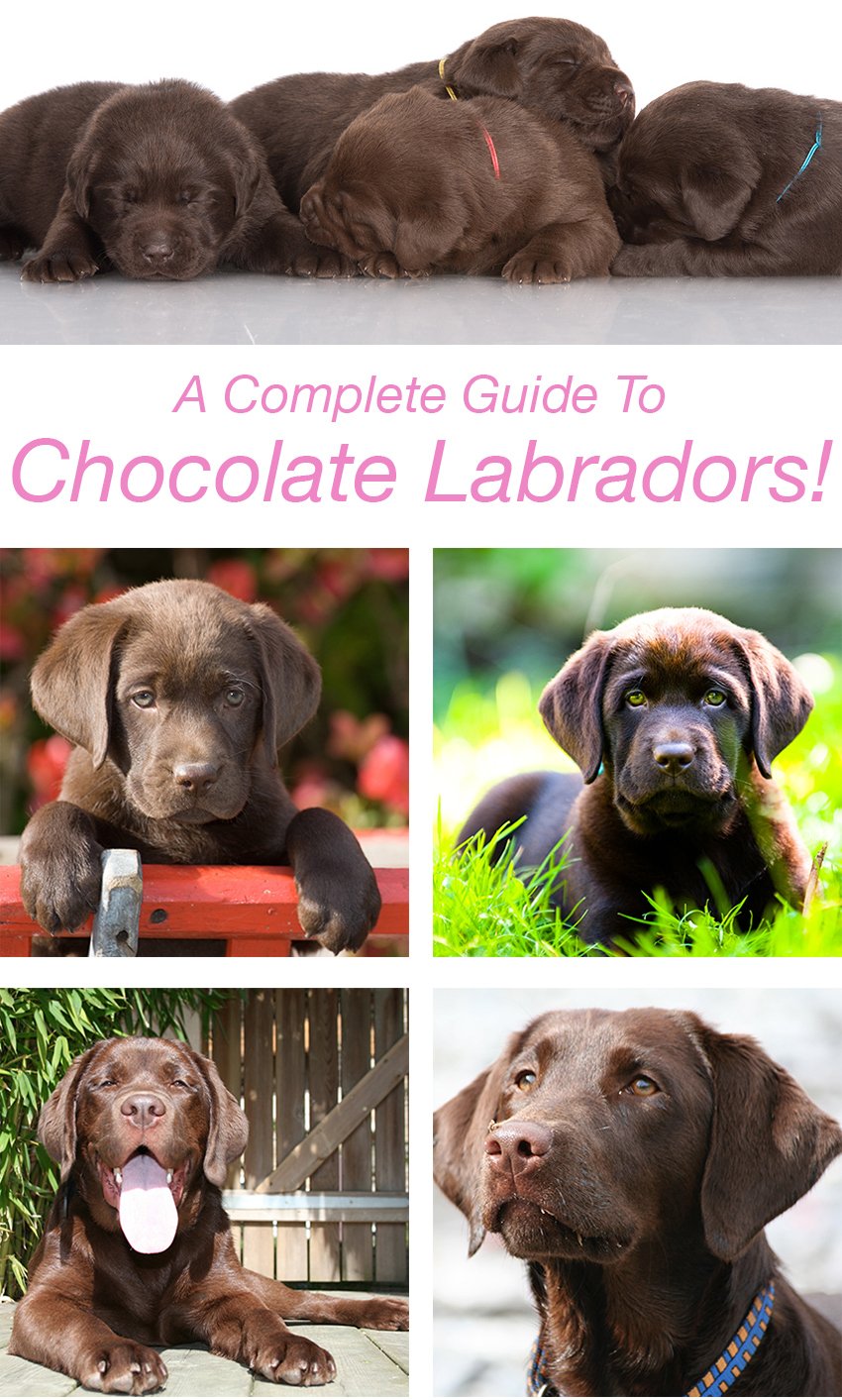
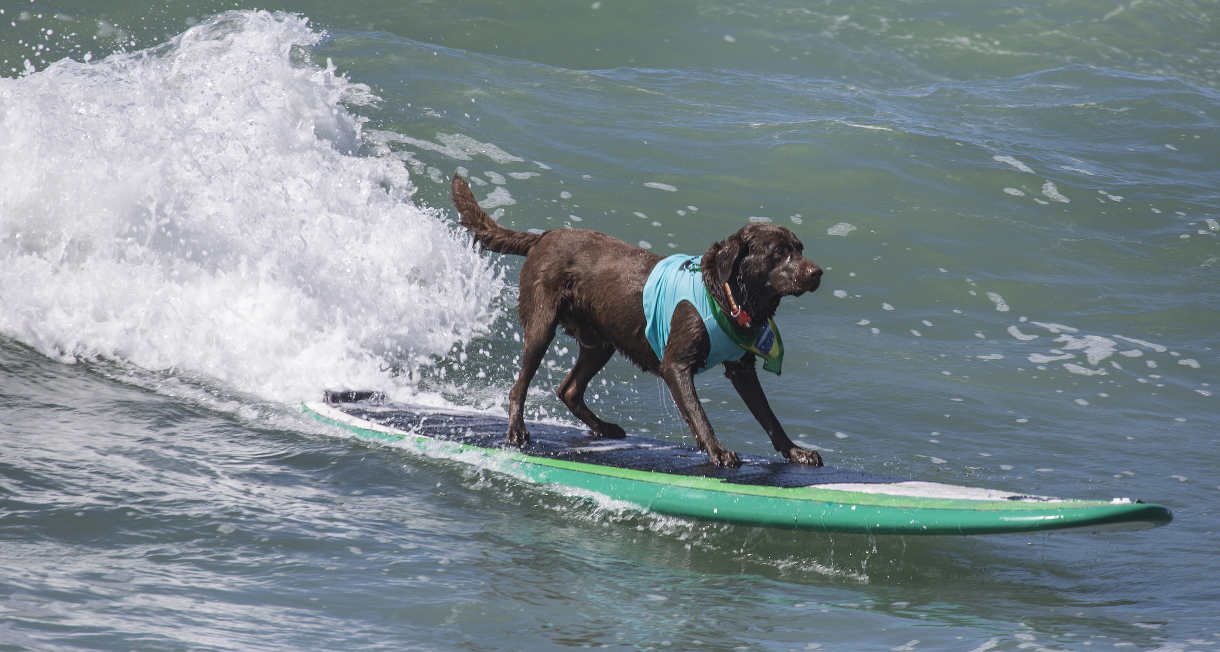
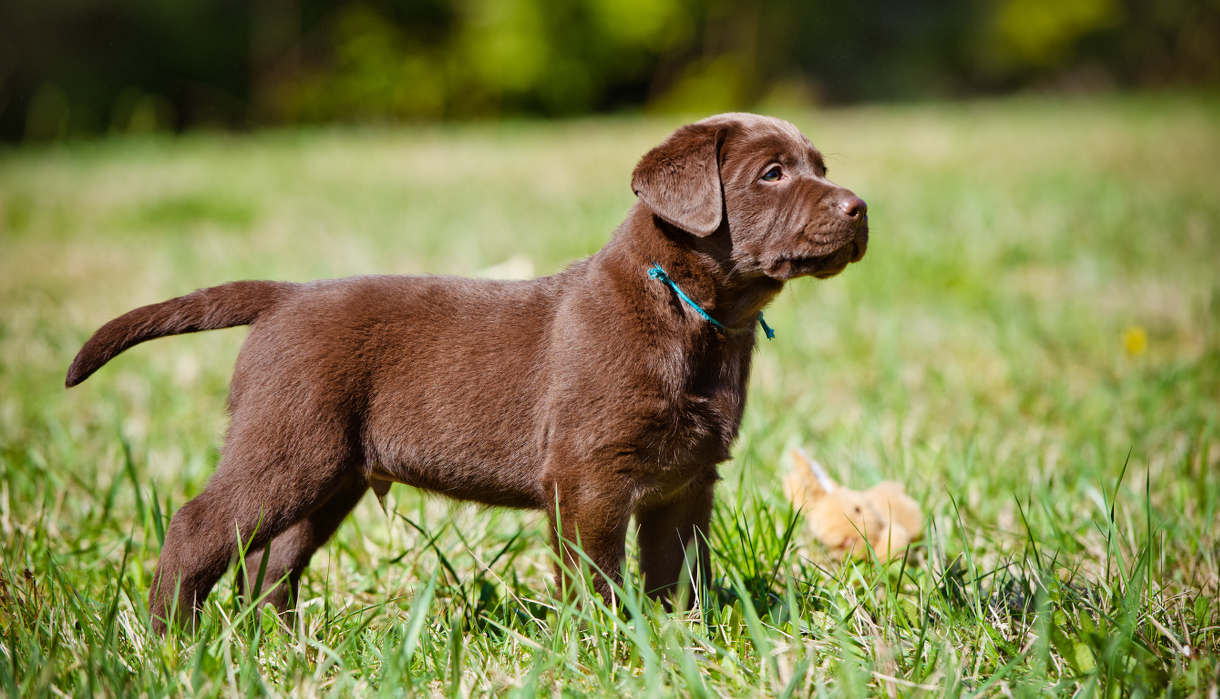


Our Chocolate Lab named Monty is now 7 years and he is my first dog ever and he is amazing! We have three boys and the patience he has towards the boys is amazing! Especially now with our third boy learning to walk, Monty allows him to use him to steady himself! I love my chocolate lab even though he is excellent at escaping! Thanks for your article I now know even more than I did before!
Thanks
Sara
Glad you liked the article Sara, Monty sounds like a really great friend 🙂
Hi
I’m in the UK
My son is 13 and autistic
He is getting an autism support dog
His name is Rolo he is 2
He is a choc lab 🙂
He will be coming home hopefully January
That’s fantastic Katie, you must be really looking forward to it!
Loved reading your article. Have always had yellow and black Labradors but got our first chocolate Labrador a few months back.
Glad you liked the article Shona, good luck with your new Lab 🙂
I am bringing home my new choc lab puppy tomorrow. I am excited for a new family member. I have learned so much from this site….good stuff
Good luck with your new puppy Steph 🙂
We have a 4 year old called Charlie. He was so easy to train, as someone above has said he really trained himself. Lovely temperament but has a genetic heart complaint so intelligent or not we just enjoy everyday we have with him.
Hi Pippa – I enjoyed reading your lovely article. We have a 6 year old female Chocolate Labrador called Becksie and she is the most amazingly kind, loving and gentle dog. We purchased her from a renowned gun dog kennels and she is beautiful- she has a broad head and oval eyes fringed with lashes, she is very dark in colour: her mother was a light chocolate colour and father black. Becksie is solid in stature and has a large ‘otter’ type tale. She is unfortunately forever on a diet as she has a tendency to steal food if given the opportunity! She is well socialized with other dogs and will happily great every breed imaginable. We have cats and Becksie will wash their ears and try to herd them around like a mummy! We all love her very much and wish that it was possible she could stay with us forever.
Thanks Miriam, glad you liked the article, best wishes to you and Becksie 🙂
I have a lovely 6 month old Chocolate, Nestle, who is all kinds of gangly and awkward and adorable; her ears almost as big as her head! She’s my second Lab (had to say goodbye to my soul mate Black sweetie when she was 14) and I’m curious about ‘elbow ears’ – what exactly are they? I couldn’t find a reference.
Thanks!
Hi Pippa I just came across your wonderful article and information. I have read all the wonderful comments that others have posted about their own labs. I personally have never owned a dog before in my life not even as a child. I’m even a little afraid of dogs till I get to know them. I am married, two sons ages 17 and 10 and I am really interested in expanding our family and getting a chocolate lab. My husband and I work full-time and soon my oldest will be off to college. My husband is hesitant on getting a dog only because he worries about our work schedules (8-5) and how fair it would be for a dog (he has owned dogs when he was a child and teenager but they were outside pets only on the farm) and just the overall responsibility of it. Also, I have mild allergies to cats/dogs even hypoallergenic ones make me itch. but a good friend has two mixed breeds in her house And I never seem to have major problems when I visit for hours because she has wood floors and keeps up on her cleaning which she says is key.
I’m at the stage in my life (almost 40) where I really want the companionship of a dog. I won’t lie I’m also scared of this step too which is why its been up for discussion for years in our household.
I believe I want a puppy so that I can have a more complete experience with a new addition ( although I know many with rescue dogs who are very happy).
I wonder if you would mind sharing one or two pieces of advice to a newbie like me considering a chocolate Lab and dog ownership for the first time. (I research everything in detail but resources always seem to make it all look like rainbow and sunshine and I’m certain there are many things I really need to consider I.e: increases to our monthly expensive, training, and growing pains of me learning how to care for a new dog).
While My kids and I really want a dog to add to our family I’m responsible enough to know This is a big step and that our new dog will be counting on us.
Do you have any advice positive or negative that might help me make a final decision one way or the other?
Hi Cindy, I hope this article will help you 🙂 https://www.thelabradorsite.com/are-you-ready-for-a-labrador/
Hi Lois, some show/bench bred dogs can make good working gun dogs. Don’t write her off because she is not field bred. 🙂 Here is some information on helping your dog lose weight https://www.thelabradorsite.com/fat-labrador/
Hello Pippa, I so enjoyed reading your article. Nice job. I have had Labradors for a very long time, starting as far back as 1974. My very first was a male black lab named Duke. In 1975 I added a chocolate male named Columbo. Over the years, I have had many Labradors, of all three colors. I currently have a Black English male that carries Chocolate, named Bentley. I have a yellow English female that does not carry chocolate ( has black pigment ), her name is HEATHER. I have an English female Chocolate that is pure for chocolate, does not carry yellow, her name is Bridgette. I have an English/American blend female chocolate that is pure for chocolate, her name is JACQUIE`. All have been tested pure, clear of the dilute gene. & ALL of my Labradors are health tested and clear of genetic disorders, hips and elbows done, heart checked, eyes checked.. and only breed to better the breed. If you follow the link I posted above, you can view more information on each of them. It is a FB page called ” Over The Moon Labradors “. I am OVER the Moon in LOVE with this BREED for the past 40 years!!! I want to help protect the integrity of this beautiful, intelligent, wonderful temperament Breed.
Glad you enjoyed the article Carol 🙂
Good for you for keeping Gracy nice and slim 🙂
We have a 5 1/2-year-old chocolate named Elvis and he is wonderful. He is so kind and gentle. He is naturally well-behaved and what training we have done with him was very easy. We got him as a puppy and he has only chewed up one thing which is amazing. He has a pile of stuffed animals and carries one all the time. He isn’t quick to warm up to strangers or other dogs and will stand very close to us until he feels comfortable with them. We don’t have children so he gets all of our attention and is very smart. He’s spoiled and we love him so much. He is the best dog ever. Thank you for the informative article.
You are welcome Patti, glad you liked it.
Hi Pippa,
Thank you for this an all your other great articles. I would love to share my opinion on why labs in general (& dogs from working lines in particular) are labelled stupid. We train them to do stupid things, be high energy and jump all over us!
I have an elderly choc lab who has been with us since she was a puppy. As she is now in her later years I always have in the back of my mind the (selfish) worry that this winter is going to be just too hard on her. Recently we got a new kitten as we had moved to a farm and need to keep the mice out of the animal feeds and we wondered how they were going to cope with each other as we had deliberately picked a cat that we knew would be high energy with a super hunting instinct. Was this going to be the last straw for our girl who seemed to want nothing more than to lay around with us.
Happily I can report that our new kitten has brought new life to our old dog, she runs around playing chase (they take turns chasing each other), wrestling and being completely over the top. Looking back, we were the ones that had slowed down around her! We would work outside long hours doing a lot of physical work and when we came in all we wanted to do was sit by the fire (corny but true) and maybe read a book. True to her nature our wonderful lab would join us sitting quietly until bed-time then snuggling up next to the bed. Now with a new playmate, and our encouragement in the form of pats for playing gentle with the new kitten, she has shown once again that labs aren’t stupid – they are whatever you reward them for being!
So glad your lab is enjoying your new kitten – thank you for sharing your story 🙂
I have a Chocolate boy named Porter. We come from a craft beer town and thought it appropriate. He has a thousand times more energy than my last lab. Jesse who lived to be 17 (she was awesome). He goes to water like a drug addict goes to crack. He is my best friend, and loves to ride shotgun in the car or truck. He flips when he sees a light reflection and goes bonkers running around the house for a long time. I love my chocolate! Side note though. He got scared when he was a puppy over fireworks and now is soooo scared of them. Hides in the corner. Any thoughts to cure that?
Steve
Bend OR
Hi Pippa,
I love your articles, especially this one!
We share our lives with a beautiful choc lab. His name is Dexter or DexterMorgan, as I call him, like the serial killer from the tv show!
Dexter is seven years old and he is the best lab I ever had. I had 3 yellow ones in the past, they were all gorgeous but Dexter is the love of my life. He is the reason why I get up in the morning!
We used to live in a house but since 2013 we moved to an apartment. Yes, we have amazing city views and a big balcony for Dexter, his kennel and several beds but it has been hard for Dex because he never got used to the pet loo. I even made a home made pet loo with cat litter and real turf on top but unfortunately or fortunately it didn’t click. He was just sunbathing on it, well it actually was the only piece of real backyard for him!
At the moment I’m not working so we are having lots of fun walking everywhere. We are also fortunate to have beautiful parks in our area, Doncaster in Melbourne Australia.
When I used to work 3 days a week, he would wait all day to go to the toilet, I couldn’t wait to finish work so I could get home and take him out.
He gets plenty of exercise and on weekends even more walks on the beach.
I guess he is a lucky dog but I’m luckier to have him.
Cheers,
Marta
Thank you for this article, very informative.
We have 5 chocolate labs…4 males and 1 female.
1 has master hunt title. And 1 a junior…but due an illness she was not able to make it to master but she was on her way. We had one litter with this pair, and bred one of those for the 5th one…so we have 3 generations. I love when they prove people wrong. Chocolates are not dumb. Oldest one is 11, 10, 2 7yr olds and our 1 yr old puppy.
Thanks again…
Thanks Crissie 🙂
I have a seven month old chocolate named Jazzmyn. We call her Jazzy. She is so smart. She was taught to sit, shake a paw and retrieve in less than five minutes each with only a few follow up lessons. When she retrieves I say “Go get it” and then Drop it”. She does this willingly and now will bring everything to me and drop it by my feet. She is really sweet and is eager to please. She is a real “people” dog and if she is chewing on a bone, is on your feet. I also have a black lab three weeks younger from the same breeder. We named her Hy-Jynx. We just call her Jynx. She is the hunter and is always sniffing out things. She is really smart too but not as eager to please. I know I have to spend more time training her than Jazz because she is really fiesty and head strong. Pups are just like kids that are raised in the same family but have totally different personalities. This is the first time we have had Labs but always have had a dog. These Labs are the smartest dogs we have ever had!
Love the names, Jazzy and Jynx 🙂
Love ! Love! Love! So enjoyed this ! My husband and I rescued 2 lab puppies. A yellow , the runt, Grace and a chocolate , Hope. They were born to an owner whose dog was visited by the neighbors, a beautiful , large, black lab…she did not want any of them!!!!!!. A local rescue group was going to rescue 8 sweet pups…they knew we were looking for labs…contacted us… How difficult to not take all home!! Our runt , Grace, after 7 months and time at Auburn University passed away due to kidney failure…broke our hearts and her siblings, our chocolate…we have taken her everywhere with us!!! She is so smart !! Too smart … After a while we got her a puppy a yellow mix who showed up at someone’s farm…. She’s happy, we are happy …Sam…”her ” puppy is happy! I am so thankful for this site….very informative!! Thank you for the investment of your time !
Thank you for your kind message Frances, glad you enjoyed the article 🙂
My choc lab is AWESOME I love him to bits and he is definately not stupid. He is also a mix between an english and american lab. He runs like the wind is very playful and LOVES any other animal even bearded dragons haha
He is my sons best friend and spoons with him every night
Its my very first lab. He is 6 and I will forever love this breed/COLOUR!!!
However…..he is very sneeky with food and if you leave any food unattended for half a second its GONE! A freshly made salad he only left the cucumber….freshly baked potbread….gone…..and he loves catfood! But thats okay I still love him to bits
Great read, chocolate labs have so much personality, ours can go from being crazy, to wanting cuddles. Have noticed she does go into a bit of depression about once a year for about 5 days. Won’t play, not interested in walks, can’t even tempt her with snacks. Then all of a sudden she snaps out of it and she is back to normal. I would not have another breed or colour of lab. The loyalty and love they give is better than you get with kids.
John.
What a wonderful article thanks Pippa . We have a 8 year old chocolate lab he is amazing . Been depressed the last year as we lost our husky x Alsatian but now he is a little puppy again ! Least he is happy now. I have had all colour labs and Milo is special I must say!
Glad you enjoyed the article Janine 🙂
Loved this article!! I have a Chocolate Lab who is turning 15 on August 13th. He is the best……my first baby! He is my kids best friend….they have know him all their lives!! He is kind, loving, funny and beautiful!! We are a Chocolate Lab family forever…couldn’t ask for a better dog for my kids to grow up with! Thanks for writing such a great article about my favorite dog☺
Thanks Kellie 🙂
We have chocolate lab number two right now. She will be 7 years old in December and she is still very playful. You hit the nail on the head when you said they love to retrieve things. Our Zoey will play fetch till your arm falls off. She is beginning to slow down some, but, it’s a nightly thing with my husband and Zoey. A close friend gave her to us when she was about 3 months old. She has grown to be a great family member. She was born in a working line, but, my husband doesn’t hunt anymore. As long as I am physically able, I will have a lab. Zoey is our fifth lab. Our first was a black lab, she had a litter of ten, 5 black, 5 chocolates, we kept a chocolate male. The next two were yellow. Only the puppy we kept was a hunting dog. Unfortunately, we had to put him down at 3 years because he was having grand Mal seizures frequently.
I find your article informative and intend to keep it in mind when we get our next lab.
Thanks for your comment Jan, best wishes to you and Zoe 🙂
That was a very informative article, thank you.
Our boy, Doonvalley Rowlf – plain, old Rolf, or Rolfaroo or Rolf-a-shmoo (only my wife calls him that, honest), was 9 a few months ago. My wife grew up with a couple of retrievers and some GSDs (and parents and siblings, she wasn’t raised by a pack of dogs), but this was my first dog.
I won’t deny that I found it all a bit tough at first. We were lucky in that we got him home at the start of a 2 week break so we had 2 full weeks to house-train him, which he learned in less than that time, so chocolates certainly aren’t daft. He was, and is, as stubborn as Hell though 😀 We did take him to puppy classes then obedience classes. We never intended to show or work him, but perhaps we should have taken him to advanced classes. However, we wanted a pet and that’s exactly what we have – a big, chocolate, furry pet. And we wouldn’t change him for anything.
He’s now older and a bit slower, especially on the way home from a w a l k but can still make the leap onto our bed or the couch and I will be thankful for every day that he can.
Thanks Colin, glad you liked the article 🙂
Hi I have never had any dog before so when we got dexter he was very boisterous at 3 months but funny, now he is 8 months old and he is not affectionate that he likes cuddles , but in a morning he will lick you and want you to scratch his belly , but sometimes he looks at me and licks my nose , but I don’t know if this is a dog thing dexter when he wants you he will grab hold of your hand and pull it with his teeth not hard but just enough to let you know , and I still have to go with him outside for a wee is this normal as I think it’s cute
Great article… We have a chocolate lab name Sadie… She is a rescue… But i really think I was the rescue… My mother had Just been placed in a memory care unit when Sadie joined our family…. She made a very difficult time a little easier… She a sweet lovable girl…. I call her my chocolatey best friend…. I tell her everybody should have chocolate in their life…
Glad you liked the article Michelle, Labradors can be a great comfort in troubled times. And I agree that everybody should have chocolate in their life! 🙂
My 3yo Chocolate female, Millie, is a face licking, cat chasing, ball/stick/bird fetching, couch lounging, boat riding, dock diving, sand/dirt/mud rolling, sun bathing, river swimming, shotgun riding, garbage/grass/poop/everything with a smell eating machine. She’s very obedient… to me. When left with anyone else or under her own supervision, her manners go out the window. Her sweet loving nature and devious behavior never ceases to amaze me… and I wouldn’t want it any other way.
Millie sounds just perfect 🙂 🙂
I’ve raised yellows, blacks, now chocolates and a rod red. And I have to agree that there is something special about chocolates! I currently have 3 in my pack, and all are related. Mom and 2 of her pups from the same litter. It still amazes me how different their personalities are! All 3 are hunting dogs, and they all have their strengths and weaknesses unique to each. I will always have at least one chocolate in my home as long as I’m able, it’s just that simple…
My Lily is an absolutely stunning mix of “English” and “American ” chocolate lab. Literally her dad was from London, mom (my mom’s dog) from southern Us. She is so smart, stubborn, sweet, cuddly. She turned 8 in February and despite arthritis and surgeries for mast cell tumors she is that happiest dog in the world. She has these soulful light amber eyes you could look into for hours. Love my Choc, she is my baby
I love those amber eyes! They are so beautiful – my cocker (same colour) has them too. 🙂
Hi Pippa! Thanks so much for the great article on Chocolate Labs! My Bailey is an American lab and I met her and her 9 siblings (all chocolate) the day she opened her eyes. She picked me to be her momma and it has been an amazing 9 years with her! The day she picked me I held her up with one hand looked her in the eye and promised her she would never be a fat lab. I have kept my promise! My vet always tells me that she is the perfect model of a lab and she wishes all of her clients kept their labs thin. I hope God blesses me with many more years with her! Bailey is the best brown dog EVER. She is my constant companion, always by my side and loves to go on adventures. She goes just about everywhere with me. Although she has never flown. She has never met a stranger and everyone she meets loves her. She thinks everywhere we go, people are there just to see her! You are right on with the instinct to retrieve but is not keen on sharing what she retrieves. She would rather play tug with it! Although she is slowing down from her puppy stage, she still has a lot of play in her and loves to go, go go! She also loves days lounging on the couch beside me. I could go on and on…as I am sure you understand! But enough for now. Thanks so much for the info on the chocolates…and I agree they are VERY SPECIAL! Paws….Beth
Thanks Beth, so glad you liked the article 🙂
Hi Pippa a really interesting article. I have a 2yr old black lab who was a rescue aged 1yrs. I’ve often wondered about some of his traits, but after reading your article I’m now convinced he’s from field bred stock. Incredibly easy to train. I followed your “total recall” book and now he’s like a homing missile. He’s never more happy than when we’re out on the moors tramping through heather and getting into water, however muddy or dirty it may be !!!! We recently acquired a Red Setter puppie, she’s now 7mth old, and at first we thought they weren’t going to get on, but as she’s growing up and not as small and “scary” he’s coming round to the idea of another dog sharing his space. I’m now actively considering getting a chocolate lab, and I’m really glad I’ve read this article as it will make my search a lot more successful.
Wonderful site, great articles and information, and fantastic thoughtful,well researched books
Keep up the good work.
My Arnie is a 9.5 year old Chocolate Lab…he has a deep chest and square head…and although elderly he only has a scattering of gray on his muzzle. Although he now has more lazy time…he still is a big puppy and enjoys playing and our regular walks. But what makes Arnie so special is he is VERY sensitive to emotions…he knows when I am sad or down and will always love me more in those times. He has such a gentle nature and is best friends with all my fur kids…other cats and dogs…and has really shown my younger yellow Lab, who was a rescue dog the way. He is a great and loyal friend
Thanks for sharing Gwen, Arnie sounds like a true friend!
I live with two labs, Mandy, who is black, and Rosie, chocolate…their personalities are quite different, but both are wonderful dogs. Mandy, we call her Buddha dog, is calm beyond belief, nothing rattles her, and she carries herself as if she is always in competition. Rosie is by far the funniest, most affectionate dog I’ve ever had…her humor, I’m convinced, is not coincidental, because when she does something funny, she looks at me with that big silly grin, like she saying, “did you see that?” She started sitting up, begging style, when she was still a puppy. At first I couldn’t figure out what she was begging for, then one day, out of frustration, I gave her a hug. She snuggled right in, and wrapped her paw around my arm. She wanted a hug!. She’s seven years old now, and still begs for hugs. I’ve lived with dogs my whole life, and love them all, but since my first Lab, 17 years ago, I am completely hooked on this beautiful, sweet, intelligent
breed.
That’s lovely Ralph, thank your for sharing, Mandy and Rosie sound like two lovely dogs 🙂
We have a amazing chocolate Labrador, I can you her retriever instinct is amazing but sharing once she retrieves not so good and smart the smartest Labrador our family has had and we have had yellow and brown and another note she is very vocal and is good at communicating what she needs.
Retrieving and sharing don’t always go hand in hand 🙂 You can teach the sharing part if you want to though – let me know if you need a link
How about a chocolate tan point or a black tan point female from the chocolate female. I love both my girls, and tan points are quite a good argument as far as true bloodlines. It makes for good conversation.
I have a chocolate Female who also happens to be a tan point, socks and cheeks as well as a bright butt, and I bred her once and had her spayed , but she threw a black tan point, with almost a mirror image only black.Morgan is a small female black and tanpoint. I have had numerous arguements as to the purity of the breed and both parents are purebred, but Jack, the sire was a rescue. and living conditions were to say the least , horrible. $100.00 convinced the owner to relinquish him. So I would like to see an article on tan points as there are quite a few online So heres to chocolate tan points, a rarity indeed ………..
Hi William, tan points are considered to be a ‘mis-mark’ though they do occur in pure-bred labs. We might do an article on mismarks at some point, but they are relatively rare in Labradors 🙂
His Pippa, What a beautiful article and could nt agree more, we have had both black and yellow labs from puppies, after losing them we eventually after much thought decided to rescue from The lab rescue and as you say after the necessary checks etc we were able to register and express our interest, we chose our beautiful chocolate boy Angus, he has an exc. pedigree and the centre pass on all possible details, Angus had been week cared for but did require some training(on-going) he is 2 years old we got him at 11 months old.He is a gorgeous boy and everywhere we go people stop to comment on how lovely he is.
Your comments were spot on he just loves other dogs and loves to retrieve and play, he is very attentive but loving at the same time.
Taking on a rescue can be a strange experience at first, I would say realistically it has taken a few months for us both to settle/trust. A puppy will follow you when off lead, but a different story with an older dog. we have been working on a secure recall (from your book total recall)we still have some work to do but getting there.
Everything is slowly falling into place now Angus has been with us 12 months, he is a great character and beautiful temprement, nothing phases him and a fantastic steady loving boy.
Thanks Jayne, I’m glad you are making progress with Angus’s secure recall, he sounds a lovely boy 🙂
Pippa, l loved your article and I have a darling 18 month old chocolate boy,named Kona for the wonderful coffee that grows in Hawaii. He is playful, smart, will retrieve but would rather just follow you and stay by your side whatever you do. i found him to be very easy to train and followed your advice to do off leash recall as a small pup, when they are keen to always be by your side. that has worked well. I had him neutered at 16 months and he has kept his delightful personality, but is less keen on checking the girls! (<:. My husband and I are in our late 60's and he has been a gentle boy with us. I also have 7 year old Puggle that he loves to play with. After having 2 delightful yellow labs, I thought I would change colors. Funny but I don't get as annoyed when he goes mudding as he is a rich expresso brown! He loves swimming and is overall the best companion I could hope for.
Hi Kathy, thanks for your kind comment, glad you have found such a lovely chocolate friend 🙂
The playfulness is really something isn’t it? I love it 🙂
You may want to work on your genetic facts more. The black and chocolate gene are not the same gene. The yellow and black gene are on the same loci. Genetically a black is EE or Ee and a yellow is ee. Brown is b and comes from one or both parents. A dog must be EE or Ee and have two b (bb) in order to be chocolate. The black coloration is only diluted to chocolate if there are 2 b genes. Chocolate also shows up in yellow as eebb will produce a Dudley, or a yellow with purple pigment on their nose and eyelids. They are genetically a chocolate with no Black or dark gene to make them chocolate. Any dog carrying one b gene will not show chocolate or be chocolate, but can throw chocolate when bred to a carrying dog. I am not trying to start an argument here, just clarifying for those that want to breed chocolate dogs to get their facts straight so they don’t get discouraged.
I’m trying to keep things simple Tina – yellow isn’t covered here 🙂 There is a full explanation on the article on colour inheritance linked above.
Hi Pippa, thanks for a brilliant article. I am the very proud owner of a16 month choc lab Alice. Everything you said rings true with Alice, she is from show lines and loves to play with people and other dogs. She’s very lucky to have a playmate next door, Barney a 19 month Yorkie x Bichonfrise .and what a pair they make! Lots of people told me choc ones were stupid but she has been really easy to train. She is just more playful than a yellow one that I had before. She does soon loose interest so I keep play and training episodes short. But she is so loveable , never barks and has got a wonderful temperament.
Love your website keep up the good work.
Thank you for your lovely comment Irene, Alice sounds great 🙂
I’m just wanting some advice if possible. Due to divorce i am having to rehome my 5 year old female choc lab and other then taking her to kennels, which i refuse to do, i am at abit of a lose as to how to find her a good, loving new forever home.
You will not regret getting a chocco lab! Best dogs on the planet. I have had them since 1991 and have two choc boys at the moment. Love them.
To whom it may concern
Hi my name is Konner,
I am in year ten student who is doing a GCSE ICT I go to falconer school in Bushey. I am writing to you to request your permission to use one of you images that I found on your website in my animal shelter project. I will use this image for an educational Purpose only and I’m not going to use it for any other purpose. I will make reference to your website in my GCSE work.
I relay appreciate your support if you could grant me the permission to use the images.
Kind regards
Konner
Falconer school
Hi Konner, many of the images used on this site are purchased from photo libraries. We cannot therefore give permission for anyone else to use them. Good luck with your project.
Hello Pipa, Good evening…
I am bit concern about my doggys HEALTH, its Brown female lab (COCO). She is 3and 1/2 months.the things which i want to know are:
Is there any kind of health difference between white lab and chocolate lab.
What should i give to my lab for her proper growth and health,she is a bit thin but not week (fingers crossed).i give her all home made food not the outside peddygree or royal canion.
will you please suggest me any kind of food chart for her as i give her milk,egg,bread,potato,RICE,spinach,cabbage.Once in a moon i sometimes give her chicken or meat in a very less amount.please suggest me a good whole chart for her.
Hi Abhi, you are not feeding a suitable diet, check out this article: feeding your puppy
Ruby our rescue is chocolate. She was a nightmare when we collected her from rescue. However I started clicker training her from the start, and she is the most amazing dog now.
Last year we joined the list for dogs to take part in behaviour research at Lincoln University. The trials that she took part in would certainly dismiss the mythe about chocolates being ‘scatty’, as the guy running the trial couldn’t get over that she was way brighter than a border collie he had been raving about. In fact we had been asked to attend for three days, but ended up doing just two lots of two hour stints, and she had completed all her tests in record time.
I would definately have another choccie, just got to convince him indoors that another dog is just what we need!
Sounds like you have a pretty smart girl there Jan 🙂
We have 2 chocolate labs – one is 4 and the other is 10 1/2. We love them both. The 4 year old is growing up – she’s almost 9 months now (in her mind that is) . The 10 year old is going grey on the muzzle and the paws. They are both therapy dogs visiting a local hospital and I have to say that we couldn’t wish for any better dogs to cheer people up – patients, staff and visitors.
Have to say that these clearly aren’t from working stock – they don’t sit still long enough.
Would never have any other breed or colour !!
My cousin has one. She is a sweetie
They are so cute.
We’re picking up our first lab in about two hours and can’t wait. She’s a 9 week old chocolate – wish us luck with this little cutie!
Congratulations and good luck! Pippa
congratulations!
My choccie is 3 and a half now and we love her dearly. Hope you are doing OK and enjoying yours.